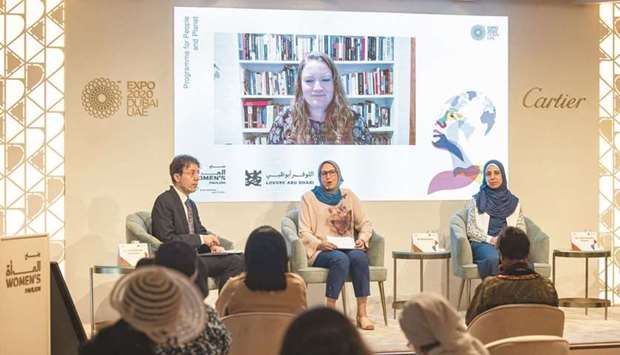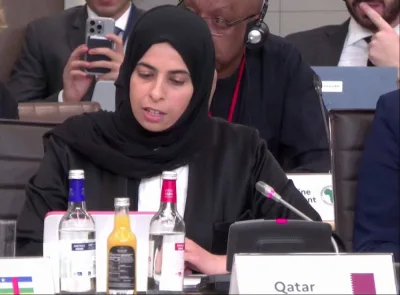“There is something especially universal about space. No one country has exclusive access to the stars; we can all see the same sky. And if we go to space and look down on earth, we can see our planet as it really is. A planet that actually does not have borders – as one blue marble; as one spaceship that we’re all living in, that we all take care of.”
These words – profound both for the truth they convey, and the context in which they were said – were part of the opening remarks made by Dr Jorg Matthias Determann at a panel discussion at Expo 2020 Dubai, last week.
Dr Determann, associate professor, History, Liberal Arts and Sciences, Virginia Commonwealth University School of the Arts in Qatar (VCUarts Qatar), a Qatar Foundation partner university, was invited by the Women’s Pavilion at the Expo, and the Louvre Abu Dhabi, to moderate a panel discussion for the 'Women in Arabia and Islam' session on the topic of 'Space Pioneers of Today Anchored in Arabian and Muslim Past', as part of the Expo’s Space Week.
The panel constituted of Dr Hedia Chackroun, associate professor, Hydraulic Engineering and Geomatics, University of Tunis El Manar, Tunisia; Dr Randa Asa’d, associate professor, American University of Sharjah, UAE; Aisha Abdulla Alowais, research assistant, Sharjah Academy for Astronomy, Space Sciences and Technology, UAE, and Dr Margaret Gaida, postdoctoral researcher, California Institute of Technology (Caltech), US.
The panelists discussed and shared their perspectives on topics ranging from the relevance and history of space exploration, the challenges faced by astronomers in the past, and in the present, the experiences of female scientists such as themselves as they progressed in their careers, and how it is encouraging to see females increasingly pursue pathways in science.
Dr Determann says he was honoured to be a part of the panel discussion, especially given that women are still underrepresented in leadership positions in science, technology, engineering and math (STEM).
“The vast majority of university presidents and deans, directors of research centres, Nobel laureates and astronauts have been and still are men,” says Dr Determann. “I was thus thrilled to be part of a discussion where all panelists were women. I am also very happy that these women represented different career stages: a research assistant, a postdoctoral researcher and two associate professors. I hope they can serve as role models for young women. With their successes, they can guide the way forward for many others.”
According to Expo 2020 Dubai’s website, one of the most famous astronomical instruments used in the ancient world, specifically in the Arabian region – the astrolabe – “was remarkably improved by a Muslim female astronomer, Mariam al-As?urlabiyya, in the tenth century. Al-As?urlabiyya’s contribution in astronomy continues to have positive impacts to date, for modern techniques such as GPS, and other equipment used for navigation. Her long-neglected achievement was finally recognised in 1990, when a main-belt asteroid, 7060 Al-?Ijliyyah, was named after her. Now, in the 21st century, Arab and Muslim astronauts, astronomers and space researchers, continue to shine in the space sector”.
To view the recording of the panel discussion, visit https://virtualexpodubai.com/listen-watch/events/women-in-arabia-and-islam-or-space-pioneers-of-today-anchored-in-arabian-and
Dr Determann, associate professor, History, Liberal Arts and Sciences, Virginia Commonwealth University School of the Arts in Qatar (VCUarts Qatar), a Qatar Foundation partner university, was invited by the Women’s Pavilion at the Expo, and the Louvre Abu Dhabi, to moderate a panel discussion for the 'Women in Arabia and Islam' session on the topic of 'Space Pioneers of Today Anchored in Arabian and Muslim Past', as part of the Expo’s Space Week.
The panel constituted of Dr Hedia Chackroun, associate professor, Hydraulic Engineering and Geomatics, University of Tunis El Manar, Tunisia; Dr Randa Asa’d, associate professor, American University of Sharjah, UAE; Aisha Abdulla Alowais, research assistant, Sharjah Academy for Astronomy, Space Sciences and Technology, UAE, and Dr Margaret Gaida, postdoctoral researcher, California Institute of Technology (Caltech), US.
The panelists discussed and shared their perspectives on topics ranging from the relevance and history of space exploration, the challenges faced by astronomers in the past, and in the present, the experiences of female scientists such as themselves as they progressed in their careers, and how it is encouraging to see females increasingly pursue pathways in science.
Dr Determann says he was honoured to be a part of the panel discussion, especially given that women are still underrepresented in leadership positions in science, technology, engineering and math (STEM).
“The vast majority of university presidents and deans, directors of research centres, Nobel laureates and astronauts have been and still are men,” says Dr Determann. “I was thus thrilled to be part of a discussion where all panelists were women. I am also very happy that these women represented different career stages: a research assistant, a postdoctoral researcher and two associate professors. I hope they can serve as role models for young women. With their successes, they can guide the way forward for many others.”
According to Expo 2020 Dubai’s website, one of the most famous astronomical instruments used in the ancient world, specifically in the Arabian region – the astrolabe – “was remarkably improved by a Muslim female astronomer, Mariam al-As?urlabiyya, in the tenth century. Al-As?urlabiyya’s contribution in astronomy continues to have positive impacts to date, for modern techniques such as GPS, and other equipment used for navigation. Her long-neglected achievement was finally recognised in 1990, when a main-belt asteroid, 7060 Al-?Ijliyyah, was named after her. Now, in the 21st century, Arab and Muslim astronauts, astronomers and space researchers, continue to shine in the space sector”.
To view the recording of the panel discussion, visit https://virtualexpodubai.com/listen-watch/events/women-in-arabia-and-islam-or-space-pioneers-of-today-anchored-in-arabian-and



